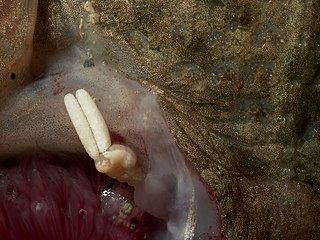
Strongyles, or alternatively, strongyls, are nematode worms of the family Strongylidae, order Strongylida. They are often parasitic in the gastrointestinal tract of mammals, especially grazers such as sheep, cattle and horses.

Plagiorchiida is a large order of trematodes, synonymous to Echinostomida. They belong to the Digenea, a large subclass of flukes. This order contains relatively few significant parasites of humans.

Chondracanthidae is a family of parasitic copepods, usually found infecting the branchial chamber of demersal fishes. It comprises the following genera:
Diplosentidae is a family of parasitic worms from the order Echinorhynchida.

Neoechinorhynchidae is a family of parasitic worms from the order Neoechinorhynchida.

Rhadinorhynchidae is a family of parasitic worms from the order Echinorhynchida.

Opisthorchiidae is a family of digenean trematodes. Opisthorchiidae have cosmopolitan distribution.

Caligus is a genus of sea lice in the family Caligidae. The species are parasites of marine fishes and could be vectors of viruses. As of 2017, the World Register of Marine Species includes the following species:

Heterophyidae is a family of intestinal trematodes in the order Plagiorchiida.

Opecoelidae is a family of trematodes. It is the largest digenean family with over 90 genera and nearly 900 species, almost solely found in marine and freshwater teleost fishes. It was considered by Bray et al. to belong in the superfamily Opecoeloidea Ozaki, 1925 or the Brachycladioidea Odhner, 1905.

The Diplectanidae are a family of monopisthocotylean monogeneans. They are all parasitic on the gills of fish. Diplectanids are small animals, generally around 1 mm in length. As parasites, they can be extremely numerous, up to several thousand on an individual fish.

Satyu Yamaguti was a Japanese parasitologist, entomologist, and helminthologist. He was a specialist of mosquitoes and helminths such as digeneans, monogeneans, cestodes, acanthocephalans and nematodes. He also worked on the parasitic crustaceans Copepoda and Branchiura. Satyu Yamaguti wrote more than 60 scientific papers and, more importantly, several huge monographs which are still in use by scientists all over the world and were cited over 1,000 times each.

The Capsalidae is a family of monopisthocotylean monogeneans, which includes about 200 species.

Chauhaneidae is a family of monogeneans within the order Mazocraeidea. There are currently 17 genera assigned to the family.

Ancyrocephalidae is a family of monogenean flatworms. The family is considered as a "temporary name" in WorMS but includes a large number of genera and species.
Lobotrema is a genus of monopisthocotylean monogeneans, belonging to the family Diplectanidae. All its species are parasites on fish. The type-species is Lobotrema madrasiTripathi, 1959.
Metarhadinorhynchus is a genus of worms belonging to the family Illiosentidae.
Metacanthocephalus is a genus of worms belonging to the family Rhadinorhynchidae.
Cryptogonimidae is a family of trematodes belonging to the order Plagiorchiida.
Haliotrema is a genus of flatworms belonging to the family Ancyrocephalidae.













